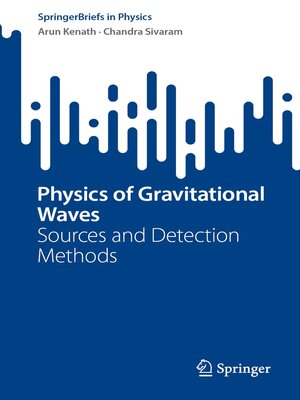Physics of Gravitational Waves
ebook ∣ Sources and Detection Methods · SpringerBriefs in Physics
By Arun Kenath

Sign up to save your library
With an OverDrive account, you can save your favorite libraries for at-a-glance information about availability. Find out more about OverDrive accounts.
Find this title in Libby, the library reading app by OverDrive.



Search for a digital library with this title
Title found at these libraries:
| Library Name | Distance |
|---|---|
| Loading... |
This book provides a concise introduction to the physics of gravitational waves. It is aimed at graduate-level students and PhD scholars.
Ever since the discovery of gravitational waves in 2016, gravitational wave astronomy has been adding to our understanding of the universe.
Gravitational waves have been detected in the past few years from several transient events such as merging stellar-mass black holes, binary neutron stars, etc. These waves have frequencies in a band ranging from a few hundred hertz to around a kilohertz to which LIGO type instruments are sensitive. LISA will be sensitive to much lower range of frequencies from SMBH mergers. Apart from these cataclysmic burst events, there are innumerable sources of radiation which are continuously emitting gravitational waves of all frequencies. These include a whole mass range of compact binary and isolated compact objects and close planetary stellar entities. This book discusses the gravitational wave backgroundproduced in typical frequency ranges from such sources emitting over a Hubble time and the fluctuations in the h values measured in the usual devices. Also discussed are the high-frequency thermal background gravitational radiation from hot stellar interiors and newly formed compact objects.
The reader will also learn how gravitational waves provide a testing tool for various theories of gravity, i.e. general relativity and extended theories of gravity, and will be the definitive test for general relativity.







